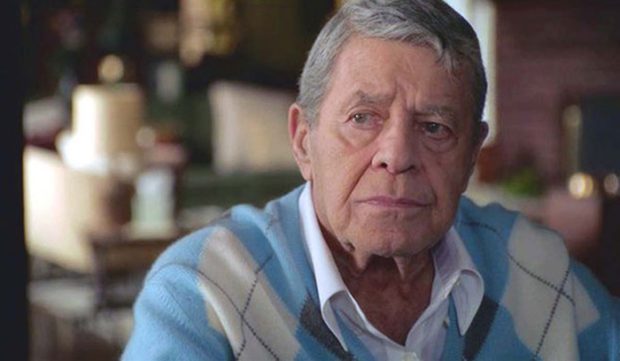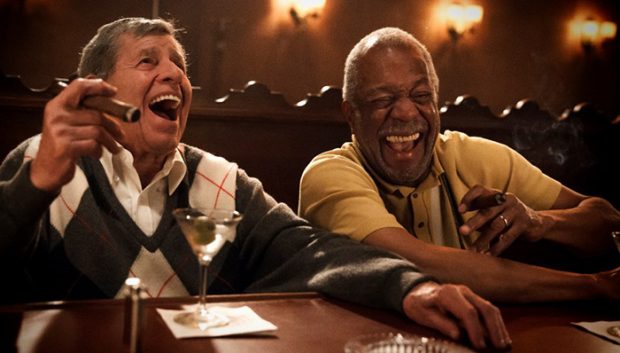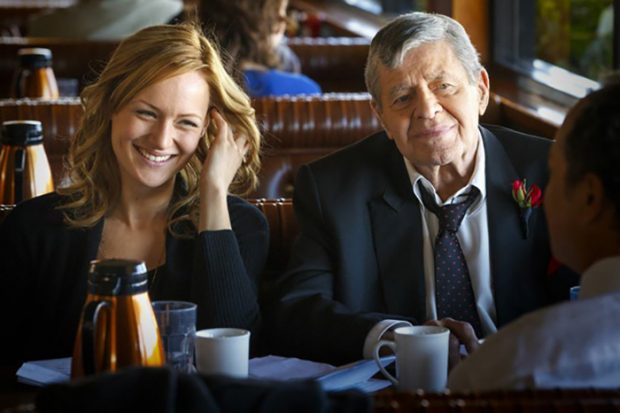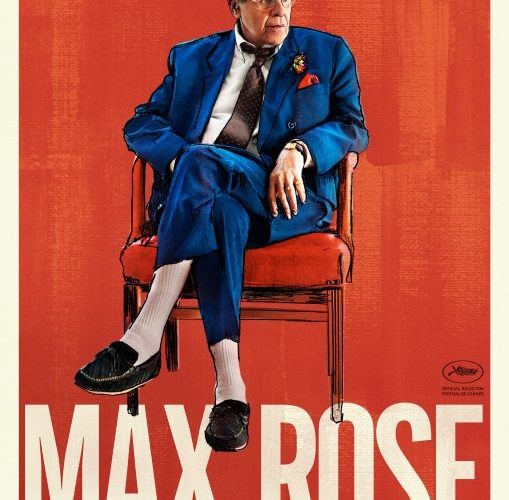A film centering on octogenarians isn’t an easy sell. Not even when you get a legend like Jerry Lewis to come out of retirement to deliver his first starring role in twenty years. So you have to give Daniel Noah credit — he got it done. And after a few years producing some effective genre films with his shingle SpectreVision, Max Rose also becomes a return for him to the director’s chair. He admits that he couldn’t see anyone else doing the material justice, the script itself based in part on the struggles he witnessed with his grandfather when his grandmother passed away. This passion project looks to shed light on the emotional turmoil of love as it pertains to a segment of society we often dismiss: senior citizens.
Love runs deep. At least we hope it does — the divorce rate probably has something else to say about this fact. Just look at Max’s (Lewis) son Chris (Kevin Pollak) facing hard times with his second marriage and a friend this widower makes in the retirement home he inevitably finds himself within (Mort Sahl‘s Jack, five times divorced). What Max and Eva (Claire Bloom) had was pure, lasting. Sixty-five years they spent together in modesty, his career as a jazz pianist never quite taking off as he had hoped. But they made due and legitimately enjoyed every single minute. When he tells her their cumulative age is 169, she tells him without a shred of sarcasm that she wishes they had spent it all together. Her loss is debilitating.

This is why the already trying time is made excruciating when Max goes through Eva’s things in the aftermath. Among them is a compact, one he surely saw often without giving a second glance. Curious, he takes out the make-up pad to find an engraving underneath — one of romance signed by a name other than his. Suddenly this glorious memory of love becomes tainted. His granddaughter (Kerry Bishé‘s Annie, remaining by his side despite her boyfriend moving to Chicago) believes he refuses to travel upstairs because of the pain of her absence, but it’s really the confrontation of a lie. Max needs to ask Eva even if only in the sorrowful recesses of his mind. And in these visions she simply places the guilt squarely back on him.
Noah’s story then becomes a series of internal battles that quickly start to spill out into the real world. Max’s demeanor with a son he feels has done wrong by his wives turns ugly because he has this idea of his Eva having an affair too. He spirals downward into the darkest parts of himself, imagining the worst as his health falters in response. The happiness and humor we know he obviously had from the way Annie continues to try cajoling some out is gone. The person he cherished most may not have reciprocated those feelings even though he knows deep down that she did. First he lost his music, than his wife. And now he’s ripped from his own past without warning. Maybe nothing he remembers was real.

This subject matter can be tough to traverse, but Lewis embraces the challenge and makes us wonder why he stopped acting in the first place. To see his soft eyes recalling Eva’s smile will melt your heart just as his anger when confronting her ghost will chill you to the bone. These are real emotions in three-dimensions, something few films outside the independent sector are willing to utilize with elderly characters. Max isn’t a goofy grandpa dealing with pain as the rest of the family copes alongside him. He’s a scorned lover trying to reconcile what could’ve been with what was. Unless he finds this mystery man to discover the whole truth, a nightmarish version of their tryst will make him bitter when remembering Eva rather than strong.
Despite the authentic performance from Lewis, however, I couldn’t help feeling as though I was waiting forever to see the culmination of this mystery. Noah is very methodical in his plotting with good reason considering how he must set-up relationships with Annie, Chris, and Eva separately from each other, but that doesn’t mean the journey isn’t tiresome as a result. Things start to look repetitive as Max attempts to push Annie to love and chastise Chris for abandoning it. We understand the complexities of these dynamics early on — an unforgettable eulogy pretty much lays things out perfectly with a post-ceremony meal pushing buttons even more. But even if every exchange is crucial to fleshing out Max’s mindset, some can’t help feeling unnecessary in their quiet conflict resolutions.

Things pick up in the retirement home. The dream-like quality of reality disappears as well as the players Max’s jadedness pushed away. He meets Walter (Rance Howard), a man who experienced a love similar to the one he thought he shared with Eva, and Lee (Lee Weaver), someone still full of life and excitement with a few connections that may help provide Max answers. Seeing these three engage with the aforementioned Jack infuses a sense of life that the somberness of what came before it suffocated. We see some of Max’s personality and he levels out psychologically to take stock. When he does finally meet the engraving’s namesake (Dean Stockwell in a wonderful turn), we receive a heartfelt conversation of jealousy, machismo, and surprising compassion.
The film’s second half from a retirement home blow-up with his family to his epiphany for reconciliation is great. Things move at an engaging speed and every actor is able to really dig into their roles. It’s a total one-eighty from the beginning’s Max languishing in self-pity to the point of my wanting to slap him awake. Again, though, we need to see his refusal to go upstairs as the metaphor it later becomes — so I wonder if it simply needed more polish to provide as much intrigue in the moment as there is in hindsight. Even so, you cannot watch Lewis during the final thirty minutes and not be awestruck by his gravitas and Noah’s writing. This is what aging actors dream of seeing cross their desk.
Max Rose opens in limited release on September 2nd.

